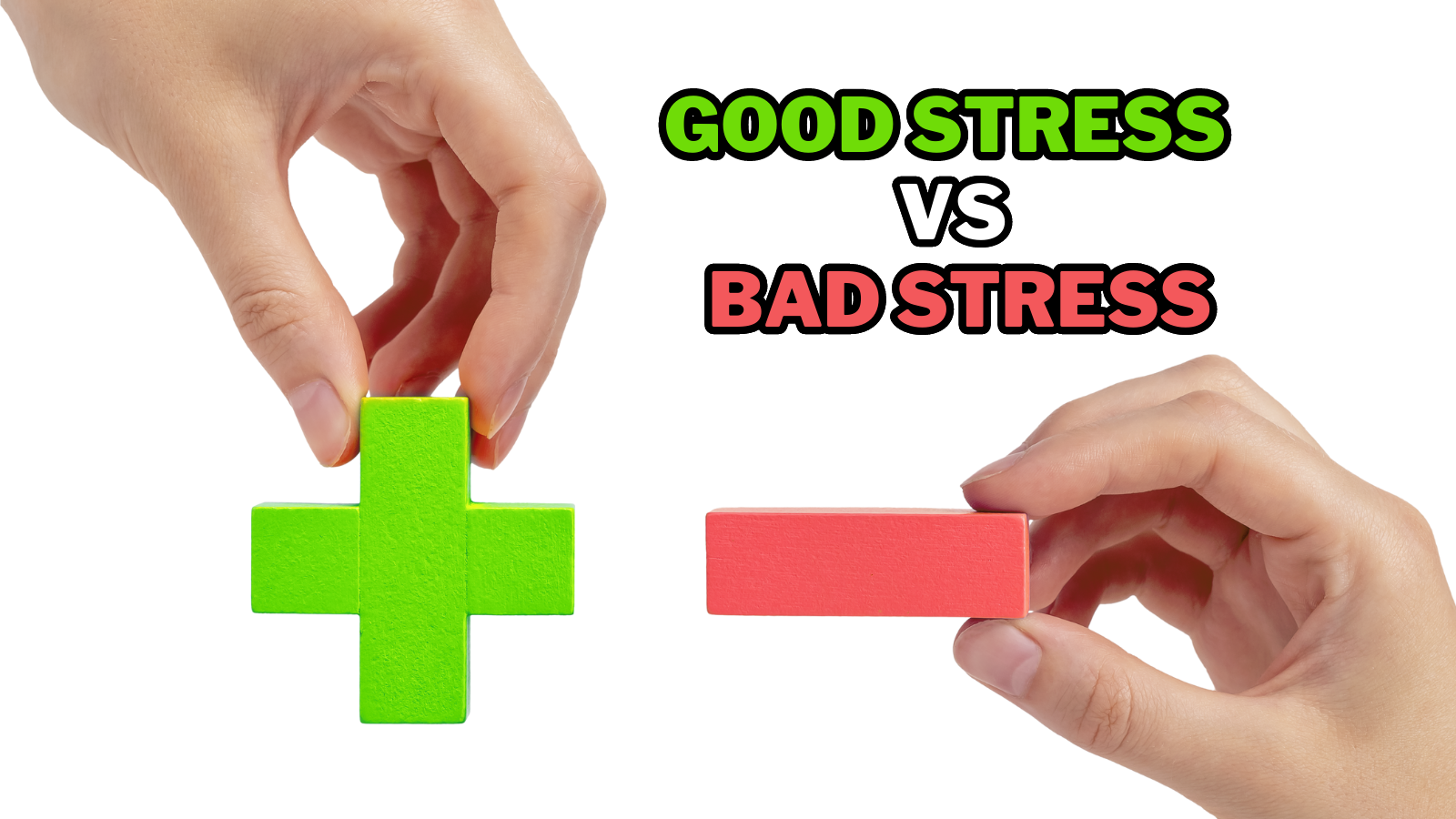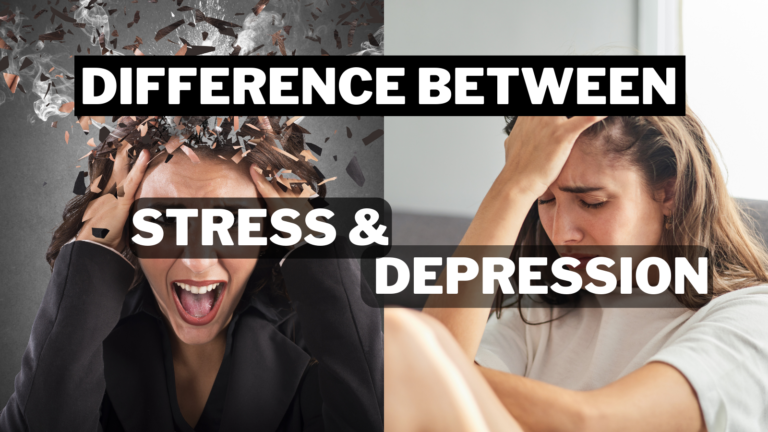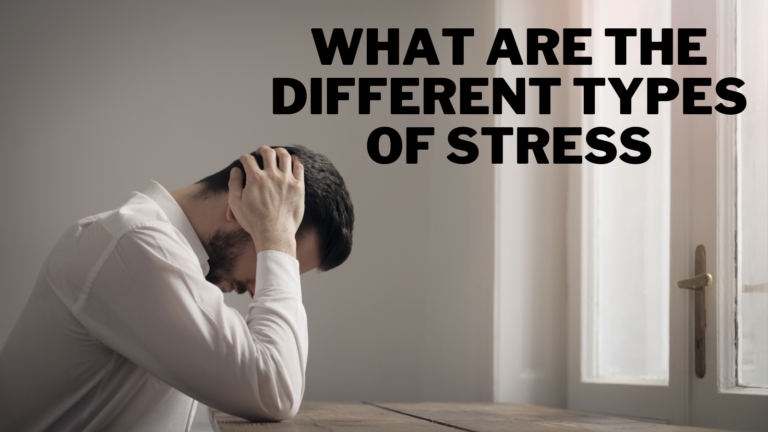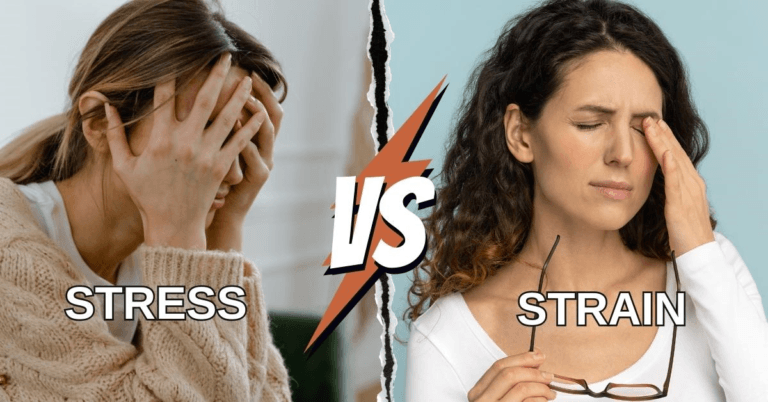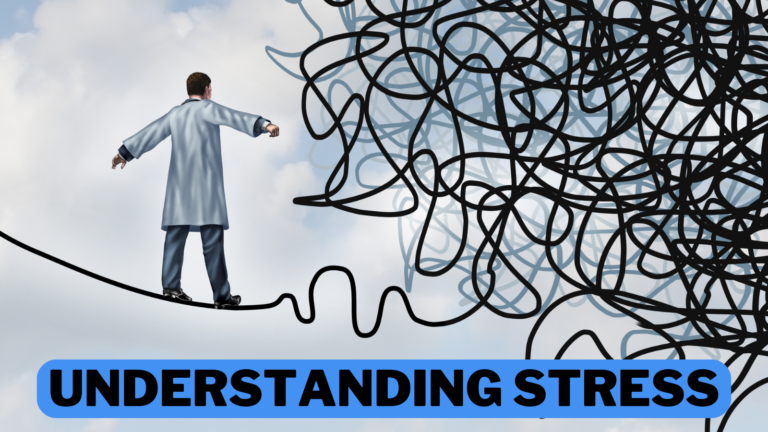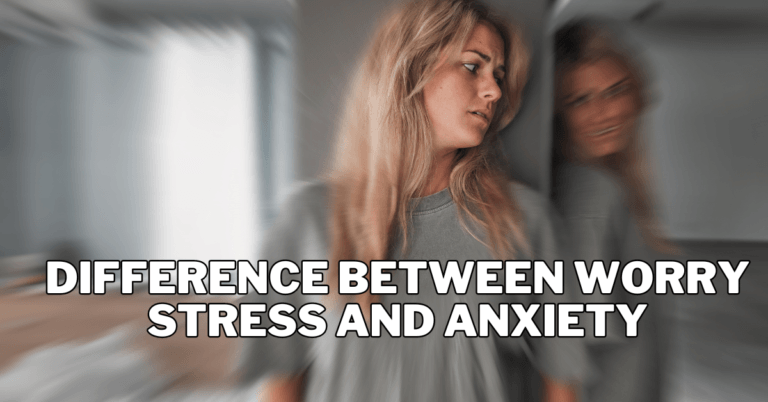Good Stress vs Bad Stress
Good Stress vs Bad Stress: Understanding The Difference
Stress is a normal aspect of life that various factors, including work, relationships, finances, and physical health, can trigger.
Not all stress is created equal, even though it can harm physical and mental health. Good stress and poor stress are two different categories of stress.
A beneficial form of stress called eustress, commonly referred to as good stress, can energize and inspire people to achieve their objectives.
Conversely, anguish, another name for negative stress, can affect the body and mind and cause several health issues.
This article will explore the differences between good and bad stress and how to identify and manage them to lead a healthier and happier life.

What Is Good Stress?
Good stress, also known as eustress, is a type of stress that can have positive effects on our lives.
Unlike bad stress, which can leave us feeling overwhelmed and anxious, good stress can motivate and energize us to accomplish our goals.
This type of stress is often associated with exciting or challenging events, such as starting a new job, getting married, or running a marathon.
While good stress can still cause physical and emotional reactions, such as an increased heart rate or nervousness, these feelings are often accompanied by excitement and anticipation.
The key difference between good and bad stress is that good stress is typically short-lived and helps us build resilience and cope with difficult situations in the future.
Our personal and professional lives may benefit from good stress since it can help us learn new abilities and increase our confidence.
It's crucial to remember that if it is too intense or persists for too long, good stress can swiftly change into negative stress.
To ensure that stress stays a constructive factor in our lives, it is crucial to understand how to detect and manage stress levels.

What Is Bad Stress?
Bad stress, also known as distress, is a negative form of stress that can harm physical and mental health.
Unlike good stress, which can be energizing and motivating, bad stress can leave us feeling overwhelmed, anxious, and even depressed.
This type of stress is often associated with events or situations perceived as threatening or challenging, such as losing a job, breaking up, or experiencing a health crisis.
When we experience bad stress, our body releases hormones such as cortisol, which can cause physical and emotional symptoms such as headaches, fatigue, and irritability.
Chronic or long-term exposure to bad stress can also increase the risk of developing serious health problems such as cardiovascular disease, diabetes, and depression.
Therefore, it is important to learn how to identify and manage bad stress to reduce its negative impact on our lives.
Bad stress can manifest in many different ways, and the symptoms can vary from person to person.
Some common signs of bad stress include difficulty sleeping, changes in appetite, feeling irritable or anxious, and experiencing physical symptoms such as headaches or stomach problems.
When we are under prolonged periods of bad stress, our bodies can become exhausted and less able to cope with additional stressors, making it difficult to manage day-to-day responsibilities.
Bad stress can also damage our relationships since it makes us snappier and less patient with others.
Finding the roots of our stress and learning healthy coping mechanisms like exercise, meditation, or getting support from a therapist or support group is essential for managing negative stress.
We can enhance our general quality of life and lower the likelihood of experiencing long-term health issues by reducing the detrimental effects of bad stress.

Symptoms Of Good Stress
Stress is often considered a negative force that can harm our health and well-being. However, not all stress is bad. Good stress can be beneficial and even necessary for personal growth and achievement.
While good stress can benefit our health and well-being, it can still cause physical and emotional reactions in the body. Some common symptoms of good stress include:
1. Increased Heart Rate And Breathing
When we experience good stress, our body releases hormones such as adrenaline and cortisol, which can cause our heart rate and breathing to increase. This helps us stay alert and focused, allowing us to perform at our best.

2. Feeling Energized And Motivated
Unlike bad stress, which can leave us exhausted and drained, good stress can energize and motivate us to take on new challenges. This can help us stay engaged and productive personally and professionally.
3. Increased Sense Of Excitement And Anticipation
Good stress is often associated with exciting or challenging events, such as starting a new job, getting married, or participating in a competitive event.
These experiences can create a sense of excitement and anticipation, which can be both exhilarating and enjoyable.

4. Improved Performance And Productivity
When we experience it, good stress can help us improve our performance and productivity. This is because releasing stress hormones can sharpen our focus and help us perform better under pressure.
5. Improved Physical Health
Engaging in physical activities such as exercise or sports can be a source of good stress. This can improve physical health, including better cardiovascular function and weight management, and reduce the risk of chronic diseases such as diabetes and heart disease.

6. Improved Emotional Well-Being
Good stress can also improve well-being by increasing positive emotions such as happiness and excitement. It can also create a sense of accomplishment and pride, boosting self-esteem and confidence.
7. Increased Social Support
Participating in challenging or exciting social events can increase social support and connections. This can help build stronger relationships and create a sense of community.

8. A Sense Of Purpose
Good stress can give us a sense of purpose and direction, as it often involves setting goals and working towards achieving them. This can help us feel more motivated and fulfilled personally and professionally.
9. Sense Of Accomplishment And Pride
Successfully managing and overcoming good stress can create a sense of accomplishment and pride, boosting our self-confidence and self-esteem.
It is important to remember that good stress is still a form of stress, and it is important to manage it effectively to prevent it from worsening.
Good stress should be viewed as a positive challenge rather than a source of overwhelming pressure.
It is important to recognize our limits and prioritize self-care to ensure we are not putting too much strain on ourselves.
By managing good stress effectively, we can reap its benefits and improve our overall quality of life.

Symptoms Of Bad Stress
Stress is a common experience that affects everyone at some point. While some stress can be beneficial, too much stress or prolonged exposure to stress can negatively affect our health and well-being.
Bad stress, also known as distress, can have a range of negative effects on our physical and emotional health. Here are some common symptoms of bad stress:
1. Physical Symptoms
Stress can cause symptoms such as headaches, muscle tension, stomach problems, chest pain, and difficulty breathing.
Prolonged exposure to stress can weaken the immune system and increase the risk of developing chronic health conditions such as heart disease, diabetes, and depression.

2. Emotional Symptoms
Stress can also have negative effects on our emotional well-being. Symptoms of bad stress can include feeling anxious, irritable, or overwhelmed, as well as experiencing mood swings or feelings of sadness or depression.
3. Behavioural Symptoms
Stress can also affect our behaviour and daily habits. This can include changes in appetite, difficulty sleeping, risky behaviours such as substance abuse, and withdrawal from social activities or relationships.
4. Cognitive Symptoms
Prolonged exposure to stress can also affect our cognitive function. Symptoms of bad stress can include difficulty concentrating, memory problems, and difficulty making decisions.

5. Relationship Problems
Stress can also lead to relationship problems, affecting our ability to communicate effectively and may cause us to withdraw from social activities or relationships.
6. Fatigue
Chronic stress can lead to fatigue and exhaustion, as the body is constantly in a state of arousal and does not have enough time to recover.
7. Increased Heart Rate And Blood Pressure
Prolonged exposure to stress can cause an increase in heart rate and blood pressure, leading to an increased risk of heart disease and stroke.

8. Digestive Problems
Stress can also affect digestion, leading to problems such as diarrhea, constipation, and stomach pain.
9. Skin Problems
Stress can also affect the skin, causing problems such as acne, eczema, and psoriasis.

10. Negative Thoughts And Self-Talk
Stress can also affect our thoughts and self-talk, leading to negative self-talk and a pessimistic outlook.
11. Weakened Immune System
Prolonged exposure to stress can weaken the immune system, making us more susceptible to infections and illnesses.
12. Sexual Problems
Stress can also affect sexual function, causing problems such as decreased libido, erectile dysfunction, and difficulty achieving orgasm.

13. Aggression And Irritability
Stress can also lead to feelings of aggression and irritability, making it difficult to get along with others and maintain healthy relationships.
Remembering that everyone feels stress differently and may have various symptoms is crucial.
However, it is essential to take action to manage your stress efficiently if you are exhibiting any of these negative symptoms.
This can entail regular exercise, getting enough sleep, and using relaxation techniques like deep breathing, mindfulness, or meditation. It also entails asking friends, family, or mental health professionals for help.
By managing bad stress effectively, we can reduce its negative effects on our health and well-being and improve our overall quality of life.

Reasons For Good Stress
Good stress, or eustress, occurs when we experience a situation or event that is challenging but also manageable and rewarding.
These experiences can activate our stress response system, releasing stress hormones like adrenaline and cortisol.
In addition to the examples provided earlier, there are other reasons why good stress can happen. Here are a few more:
1. Positive Social Interactions
Social interactions with friends, family, and loved ones can also lead to good stress. These interactions can activate the release of oxytocin, a hormone associated with feelings of bonding, trust, and happiness.
2. A Sense Of Purpose
Having a sense of purpose or meaning can also lead to good stress. Engaging in work or activities we feel passionate about can positively activate our stress response system, helping us stay motivated and focused.
3. Creative Pursuits
Engaging in creative pursuits, such as writing, painting, or playing music, can also lead to good stress.
These activities can help us tap into our creativity and express ourselves in new and exciting ways, creating a sense of satisfaction and accomplishment.

4. Physical Activity
Regular physical activity like running, weightlifting, or yoga can also lead to good stress. Exercise activates our stress response system, releasing endorphins and natural mood boosters.
5. Novel Experiences
Trying new things, such as travelling to a new place or trying a new type of food, can also lead to good stress.
Novel experiences activate our brain's reward centers, creating excitement and anticipation.
6. Positive Self-Talk
Positive self-talk, or talking to ourselves optimistically and encouragingly, can also lead to good stress.
Focusing on our strengths and abilities can help us feel more confident and motivated, leading to a positive stress response.

7. Spiritual Practices
Spiritual practices, such as meditation, prayer, or mindfulness, can also lead to good stress. These practices can help us connect with a higher power and activate feelings of inner peace and well-being.
8. Supportive Relationships
Positive, supportive relationships with family, friends, and colleagues can also lead to good stress.
Feeling connected to others and supported in our goals and aspirations can activate the release of oxytocin and other feel-good hormones, leading to a positive stress response.
Overall, there are many different reasons why good stress can happen, and the key is to seek out experiences and activities that are both challenging and rewarding but also manageable and enjoyable.
By embracing good stress and using it to our advantage, we can improve our performance, enhance our well-being, and achieve our goals.

Reasons For Bad Stress
Bad stress can happen for many reasons, from work and relationship issues to financial and environmental stressors.
Understanding the sources of bad stress can help us to develop effective coping strategies and reduce its impact on our health and well-being. Certainly, here are a few points explaining why bad stress happens:
1. Life Challenges
Bad stress can happen when faced with difficult or unexpected challenges in life, such as losing a job, experiencing a relationship breakdown, or dealing with a health issue.
These challenges can trigger our stress response system, leading to feelings of anxiety, worry, and overwhelm.
2. Work-Related Stress
Workplace stress is a common cause of bad stress and can come from various sources, such as heavy workloads, long hours, difficult bosses or colleagues, or a lack of control over one's work. These stressors can lead to feelings of burnout, exhaustion, and disengagement.

3. Trauma And Adversity
Experiencing trauma or adversity, such as abuse, neglect, or violence, can also lead to bad stress. These experiences can have long-lasting effects on our physical and emotional health and can lead to symptoms of post-traumatic stress disorder (PTSD).
4. Chronic Stress
Prolonged exposure to stress, such as ongoing financial difficulties, caregiving responsibilities, or relationship problems, can also lead to bad stress.
Chronic stress can have a cumulative effect on our health and well-being, leading to physical and emotional symptoms that can interfere with our daily functioning.

5. Negative Thought Patterns
Negative thought patterns, such as rumination, catastrophizing, or pessimism, can also contribute to bad stress.
When we engage in negative self-talk or worry excessively about the future, it can activate our stress response system, leading to feelings of anxiety and distress.
6. Lack Of Social Support
A lack of social support, such as not having close friends or family members to turn to in times of need, can also contribute to stress.
Feeling isolated or disconnected from others can activate our stress response system, leading to feelings of loneliness, anxiety, and depression.
7. Financial Stress
Financial stress is a common source of bad stress and can come from various sources, such as debt, unemployment, or unexpected expenses. These stressors can lead to feelings of helplessness, despair, and anxiety.
Overall, there are many different reasons why bad stress can happen, and the key is to identify the sources of stress in our lives and take steps to manage them effectively.
By developing healthy coping strategies and seeking support when needed, we can reduce the impact of bad stress on our health and well-being.

Conclusion
In conclusion, stress is a natural part of life, whether good or bad. Good stress, also known as eustress, can help us perform at our best and feel energized, while bad stress, also known as distress, can negatively affect our physical and mental health.
It is important to recognize the difference between these two types of stress and take steps to manage them effectively.
By developing healthy coping strategies, seeking support when needed, and practicing self-care, we can reduce the impact of bad stress on our health and well-being.
With a greater understanding of stress and its effects on our lives, we can strive to live happier, healthier, and more fulfilling lives.
I trust you enjoyed this article about Good Stress vs Bad Stress. Please stay tuned for more blog posts to come shortly. Take care!
JeannetteZ
>>>Please click here to read my all-inclusive article about Lessons That Will Teach You All About Stress<<<
>>>Are you interested in Natural Healing And Stress Relief through Herbs? Please click here for my #1 Recommendation<<<
Your Opinion Is Important To Me
Thoughts? Ideas? Questions? I would love to hear from you. Please leave me your questions, experiences, and remarks about Good Stress vs Bad Stress in the comments section below. You can also reach me by email at Jeannette@Close-To-Nature.org.
Disclosure
This post may contain affiliate links. I earn from qualifying purchases as an Amazon Associate and other affiliate programs. Please read my full affiliate disclosure.
You might also enjoy these blog posts:
8 Best Ways To Stop Worrying About Health
Learning A Language And Stress Management

